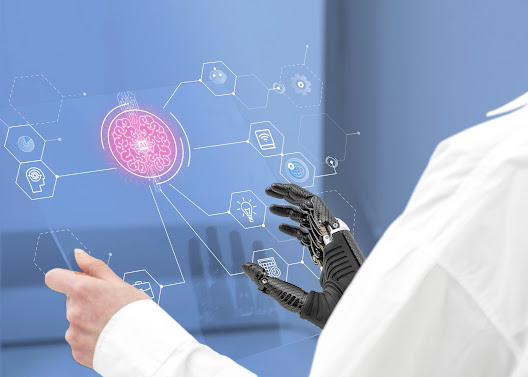How is Artificial Intelligence Being Utilized in India's Healthcare Sector?
"Revolutionizing Healthcare: The Role of Artificial Intelligence in India's Healthcare Sector"
Introduction:
Artificial Intelligence (AI) is playing a transformative role in reshaping the healthcare sector globally, and India is no exception. The integration of AI technologies in healthcare has the potential to address challenges such as accessibility, affordability, and efficiency, thereby improving patient outcomes and healthcare delivery. This article explores the diverse ways in which AI is being utilized in India's healthcare sector, highlighting key applications, benefits, and challenges.
Diagnostic Imaging and Radiology:
AI has significantly impacted diagnostic imaging and radiology in India. In 2024, AI-powered image analysis systems are assisting healthcare professionals in interpreting medical images such as X-rays, CT scans, and MRIs. These systems can detect anomalies, assist in early disease diagnosis, and improve the accuracy of radiological interpretations. AI algorithms are helping to address the shortage of radiologists, particularly in rural areas, by providing timely and reliable diagnostic support.
Remote Patient Monitoring and Telemedicine:
Telemedicine and remote patient monitoring have gained prominence, especially in a country as vast and diverse as India. AI technologies enable remote tracking of patients' vital signs, chronic conditions, and medication adherence. In 2024, telehealth platforms leverage AI to facilitate virtual consultations, making healthcare more accessible to individuals in remote areas. AI-driven chatbots and virtual assistants assist in preliminary consultations, enhancing the efficiency of telemedicine services.
AI-Enhanced Electronic Health Records (EHR):
The implementation of Electronic Health Records (EHR) is being augmented by AI capabilities in India. In 2024, AI-driven EHR systems help manage patient data more efficiently, ensuring accessibility and interoperability across healthcare facilities. These systems use natural language processing (NLP) to extract valuable information from unstructured data, reducing the administrative burden on healthcare professionals and enhancing the overall quality of patient care.
Predictive Analytics for Disease Prevention:
AI-driven predictive analytics is increasingly being used for disease prevention in India. Machine learning algorithms analyze vast datasets, considering factors like patient history, demographics, and lifestyle. In 2024, these systems can predict the likelihood of developing certain diseases, enabling proactive interventions and personalized preventive care. This approach is crucial for managing the rising burden of non-communicable diseases in the country.
AI in Drug Discovery and Development:
The pharmaceutical industry in India is leveraging AI for drug discovery and development. In 2024, AI algorithms analyze biological data, genomic information, and chemical structures to identify potential drug candidates. This accelerates the drug development process, reduces costs, and increases the likelihood of discovering novel therapies. AI-driven drug repurposing is also gaining traction, exploring existing drugs for new therapeutic applications.
Personalized Medicine and Treatment Plans:
Personalized medicine is becoming a reality in India with the integration of AI. In 2024, AI analyzes patient-specific data, including genomic information and treatment responses, to tailor personalized treatment plans. This approach improves treatment efficacy, minimizes adverse effects, and enhances overall patient outcomes. AI-driven precision medicine is particularly beneficial in oncology and other areas where targeted therapies can significantly impact patient care.
AI in Mental Health Diagnosis and Support:
The field of mental health is benefiting from AI applications in India. In 2024, machine learning algorithms analyze behavioral patterns, speech, and other data to assist in the early detection of mental health conditions. AI-driven virtual mental health assistants and chatbots provide support, resources, and interventions, contributing to more accessible and personalized mental healthcare services.
Healthcare Robotics and Robotic Surgery:
Healthcare robotics, including robotic surgery, is gaining traction in India. In 2024, robotic surgical systems equipped with AI capabilities enhance the precision and capabilities of surgeons. These systems assist in complex surgeries, offering improved outcomes, reduced recovery times, and enhanced patient safety. Robotics is also employed in tasks such as medication delivery and physical rehabilitation, contributing to the overall efficiency of healthcare services.
AI for Public Health Surveillance:
Public health surveillance is a critical aspect of healthcare management, and AI is playing a pivotal role in India. In 2024, AI-driven systems analyze epidemiological data, social media trends, and other sources to monitor the spread of diseases and identify potential outbreaks. This real-time surveillance enhances the country's ability to respond effectively to public health challenges, enabling proactive measures and resource allocation.
AI in Health Insurance and Fraud Detection:
The health insurance sector in India is incorporating AI for improved efficiency and fraud detection. In 2024, machine learning algorithms analyze claims data to identify patterns indicative of fraudulent activities. AI-driven systems help insurance companies assess risks, set premiums more accurately, and streamline claims processing, contributing to a more sustainable and reliable health insurance ecosystem.
AI in Medical Education and Training:
AI is transforming medical education and training in India. In 2024, AI-driven platforms provide interactive learning experiences, virtual simulations, and personalized training modules for healthcare professionals. These tools enhance medical education, allowing students and practitioners to stay updated with the latest advancements, practice surgical procedures in virtual environments, and continuously improve their skills.
AI Governance and Ethical Considerations:
As AI applications in healthcare expand, there is a growing emphasis on governance and ethical considerations. In 2024, India is actively working on establishing frameworks to ensure responsible AI use, data privacy, and ethical guidelines. Addressing concerns related to bias, transparency, and patient consent is crucial to fostering trust in AI-driven healthcare solutions and ensuring equitable access to the benefits of these technologies.
Challenges and Future Outlook:
While the integration of AI in India's healthcare sector brings forth numerous benefits, it is not without challenges. Ensuring data privacy, addressing ethical concerns, cryptocurrency prices and news and overcoming infrastructure limitations are key hurdles. Additionally, there is a need for continuous education and training to enable healthcare professionals to effectively utilize AI technologies.
Looking ahead, the future of AI in India's healthcare sector holds immense promise. Continued research, collaboration between stakeholders, and a commitment to ethical AI practices will be essential in harnessing the full potential of these technologies. As AI continues to evolve, it has the potential to revolutionize healthcare delivery, making it more accessible, efficient, and patient-centric across the diverse landscape of India.
Read More Blogs : Top 10 Artificial Intelligence Trends to Lookout For in 2023
What is the Difference Between Strong and Weak AI?
Top 10 AI and Robotics Companies to Watch in Tech Industry



Comments
Post a Comment